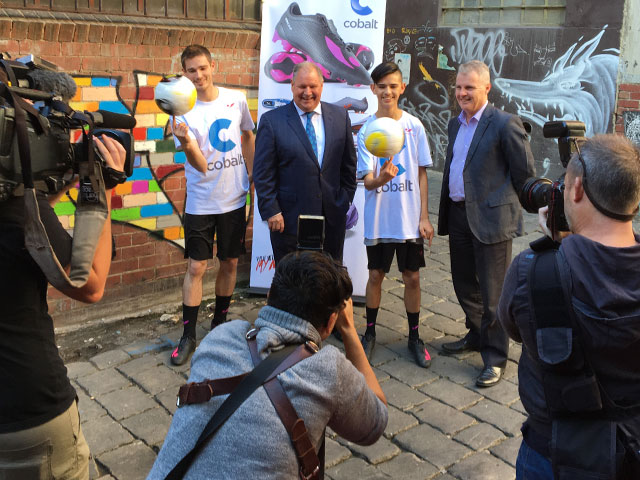Cobalt recently presented at the official launch of Melbourne Knowledge Week. In his opening address, the Melbourne Lord Mayor Robert Doyle singled out the Cobalt designed Concave boots and Keepcup as examples of innovative ideas succeeding in world markets.
Melbourne Knowledge Week runs annually with more than 60 horizon-expanding events showcasing the innovation, creativity and technology shaping the city’s future.
As one of the city’s leading design groups, Cobalt is featured within BlackBOX, a collection of Melbourne design innovations that have endured over the last 150 years. As well as the Lord Mayor, other attendees at the launch included BlackBOX’s curator Ian Wong, City of Melbourne Councillor Jackie Watts, and former RMIT Industrial Design graduate and now senior designer at Apple Corp in California Peter Russell-Clarke.
Designing locally; thinking globally
As one of Australia’s largest product development groups, Cobalt is a prime example of Melbourne’s creative industries revival and growing global impact.
Since forming in 1996, Cobalt have been developing creative, commercially-driven product designs for manufacturers long before ‘innovation’ became a buzzword, or governments began spruiking the benefits of an ‘ideas boom’. The team of industrial designers and design engineers are headed by Jack Magree, Steve Martinuzzo, and Warwick Brown who all completed their degrees together at RMIT University in the 1980s.
The group has developed many iconic everyday items like the KeepCup, Concave Boot or Maplock GPS Security Lock, and even more specialist products such as atomic absorption spectrometers or heart defibrillators. While we may not have either hidden at home under our coffee tables, they still perform at the highest level of their respective fields.
Cobalt is quick to point out the fundamental difference between design and other creative pursuits. “Design for us is not about our own agenda. It is a 100% commercial activity where we help our clients profit by having great products to sell” notes Cobalt Principal Jack Magree, who goes onto say “we believe this is best done by developing products from the user’s perspective. The product must work exceptionally well in terms of function, quality etc.- but also delight and emotionally connect with people’s subconscious needs.”
According to Martinuzzo, Australian businesses and entrepreneurs can benefit by embracing the structural redefinition of manufacturing which has occurred over the last decade. “Technologies like CAD (computer aided design) and digital manufacturing (including 3D printing) as well as crowdfunding have
democratised product development. Any organisation, large or small, can now change the game as long as they have an idea that better meets people’s needs and the vision to do it better than anyone else”.
This trend has nullified Australia’s historical hurdle of being a long way away from global markets. Even giant multinationals have found, even though they have closed the door on traditional local manufacture, companies like Agilent, Ford and Holden have expanded their Melbourne design and engineering facilities integrating them within their global product development streams. In fact, says Martinuzzo “Melbourne is already taking its place as a world-class design city. The combination of our multicultural society, excellent tertiary sector and efficient manufacturing base mean we can- and are producing smart products that resonate and succeed globally. Being in Melbourne is now an asset, not a limitation”.
Keepcup is one such example. Whilst now ubiquitous, the range of reusable coffee cups was conceived to provide an answer to an unmet need; how to enjoy take away espresso coffee without consuming disposable cups. The challenge was brought to Cobalt 8 years ago, who then designed a tangible product that addressed functional elements like sealing and tooling, as well as cultural drivers that would help people feel good (or ‘emotionally connect’) with the product. Within a year it was being locally manufactured and selling beyond expectations. And now, Keepcup have a complete range of products being exported to dozens of countries and the company’s success has spurned a whole category of competitors, all following Keepcup and Cobalt’s design lead.










